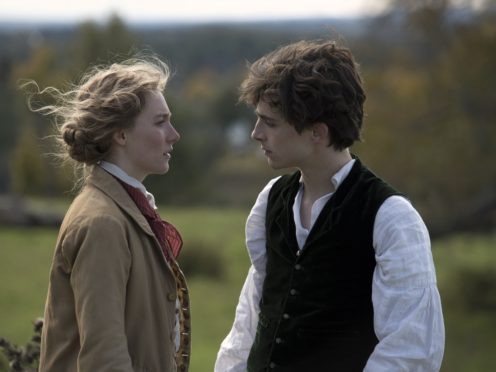The first reviews of Greta Gerwig’s adaptation of Little Women are out and the latest big screen version of Louise May Alcott’s classic novel has been praised by critics.
The Guardian hailed the film, saying: “There’s nothing little about Greta Gerwig’s rich, warm, bustlingly populated and passionately devoted new tribute to Louisa May Alcott’s classic novel of sisterhood.
“She revives Little Women as a coming-of-age movie, a marriage comedy, a sibling-rivalry drama – and, perhaps most interestingly of all, an autofictional manifesto for writing your own life.
The review added: “Gerwig’s Little Women have a great collective vitality, always puppyishly hugging and crowding around, while getting into scrapes and putting on theatre shows. They have something of the Bronte sisters or even the Dashwood sisters but with a much more rough-and-ready Americanness.”
US trade publication Variety said: “The book was written at the pressure of Alcott’s publisher for young female readers, but Gerwig’s version doesn’t talk down in the slightest and may in fact play better with adults, especially those who find mainstream movies too salacious and immoral.
“Little Women is just the opposite: a wholesome, kindhearted tale of generosity and good manners, where malicious acts occasionally occur (as when Amy destroys Jo’s novel) but not nearly as often as acts of charity (like the time the March girls offer their Christmas dinner to a starving family down the road).”

Another US trade The Hollywood Reporter wrote: “Graduating from an intimate portrait of the rocky rites of passage of contemporary female adolescence to a considerably larger-scale ensemble piece depicting the path to maturity of four sisters in 19th century Massachusetts, Greta Gerwig shows that her own assured transition to writer-director with 2017’s Lady Bird was no fluke.
“Her gratifying take on Louisa May Alcott’s Little Women brings freshness, vitality and emotional nuance to source material which has been etched for generations into the popular imagination, shaking up the chronology to reinvigorate the plot’s familiar beats.”
Film industry and review website Indiewire reassured book lovers that the adaptation would not disappoint, saying: “Fans of the original novel (and the first-rate 1994 Gillian Armstrong adaptation of Alcott’s book) shouldn’t fret over the contemporary implications of Gerwig’s film.
“While it’s consumed with questions of ambition, economics and a woman’s place in the world, Little Women is clearly the work of someone steeped in affection for the original, and keenly aware of how the concerns of Alcott and the March sisters (loosely based on the author’s own family) have never quite abated, no matter the time.
“In short: it’s the same Little Women that has endured for centuries, given new life with an original narrative conceit, and a level of craftsmanship that’s nothing short of stunning.”

Film magazine Empire praised the film as the best big screen version of the book, saying: “If there were any remaining doubts that Greta Gerwig is a major talent in American cinema, put them to rest now. Her solo debut, Lady Bird, was a delight; this follow-up adaptation of an American classic takes an overly familiar story and makes it immediate and important and daring. In a year packed with fascinating films about women, here’s the grandmother of them all.
“Those who haven’t read it tend to dismiss Louisa May Alcott’s Little Women as juvenalia, lacking in drama or purpose. Certainly, it has its fluffy moments (all the religious piety, and the bit with the hair curling), and yes, it is essentially about four nice middle-class white girls who get along okay in mid-19th-century Massachusetts.
“But it’s also a story about women who want things for themselves, who have ambitions and good intentions (sometimes bad intentions) and hopes for the future that are not limited to marriage or children. That wealth of character, the sheer fact of taking women’s wishes seriously, puts it up there with Jane Austen in terms of formative books for teenage girls.
“Gerwig takes several bold storytelling choices that make this adaptation quite unlike any of its predecessors.”
Little Women is released in UK cinemas on December 26.
